Publications
For submission of articles or Working Papers to CEsA, please send an email to:
comunicacao@cesa.iseg.ulisboa.pt
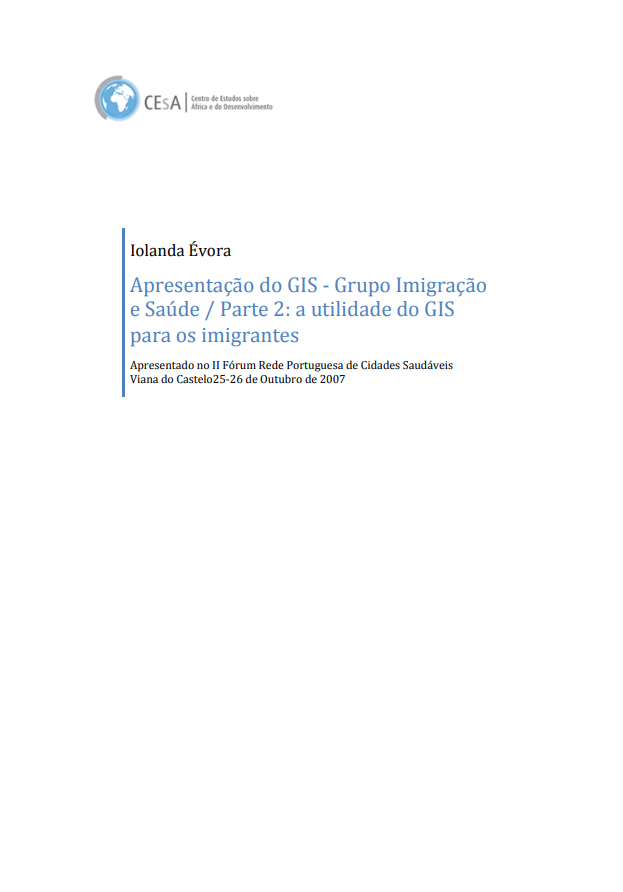
Apresentação do GIS – Grupo Imigração e Saúde Parte 2: A utilidade do GIS para os imigrantes
Abstract:
GIS (Immigration and Health Group) proposes the involvement (virtual and real) of people, public and private institutions which, by their professional activity, develop research projects and tasks related to the health of the immigrant population. At this moment, GIS is already a reference as a privileged and credible source of information on health/immigration initiatives. With its functioning model – decentralised action, provided by the network structure, in which initiatives are suggested by all – it has promoted an intense exchange, which in the field of immigration and health, is perhaps unprecedented in Portugal, if we think of the scale of its reach and the number of members of the group. This exchange is made between its members, whose actions may be academic or more practical, therefore, of intervention in the field. An analysis of the profile of the GIS members shows that a significant part of them deal with the immigration/health theme at both possible levels of action, either at the academic or practical level of intervention. Because of this profile, and because GIS promotes the meeting of people and their institutions at both levels, we can say that GIS is an important practical-reflective proposal, therefore, an important contribution to a more reflected intervention and a reflection closer to reality, when it comes to immigration/health. Apresentação do GIS – Grupo Imigração e Saúde Parte 2 : a utilidade do GIS para os imigrantes was given at the II Forum Portuguese Healthy Cities Network Viana do Castelo 25-26 October 2007.
Quotation:
Évora, Iolanda. 2011. “Apresentação do GIS – Grupo Imigração e Saúde Parte 2 : a utilidade do GIS para os imigrantes”. Comunicação apresentada no II Fórum Rede Portuguesa de Cidades Saudáveis, Viana do Castelo.
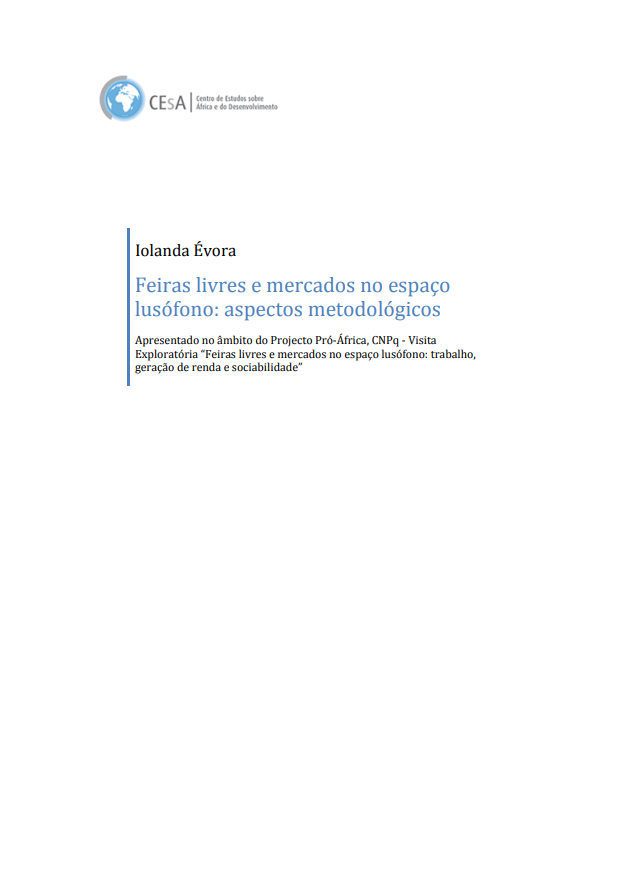
Feiras Livres e Mercados no Espaço Lusófono: Aspectos metodológicos
Abstract:
In Feiras livres e mercados no espaço lusófono: aspectos metodológicos the focus falls on aspects of the field of our research and we understand that a reflection on it is important due to: 1- specificities of our empirical object (the free fairs and markets that are work and economic activities present in urban centres in Brazil, Cape Verde and Guinea-Bissau; 2- our methodological options and ethical-political stance towards social reality and its actors; 3- the type of study we intend to carry out. Among the structuring axes of our research proposal we highlight that 1- we have the same set of concerns in relation to the different realities and contexts of study, that is, our focuses are: (a) the everyday processes that organize work in markets and free markets; (b) the conditions for the construction of a work base, that is, the set of knowledge, material resources and personal relationships that enables workers to generate income through work in micro-enterprises; 2- it is not intended to collect data for a comparison, but to ensure a cumulative knowledge, in which the realities of local fairs and markets, in each of the urban centres, are studied in their uniqueness and illuminate the understanding of the other contexts. This paper was presented at the Pro-Africa Project.
Quotation:
Évora, Iolanda. 2011. “Feiras livres e mercados no espaço lusófono: aspectos metodológicos”. Comunicação apresentada no âmbito do Projeto Pró-África, CNPq Visita Exploratória “Feiras livres e mercados no espaço lusófono: trabalho, geração de renda e sociabilidade.
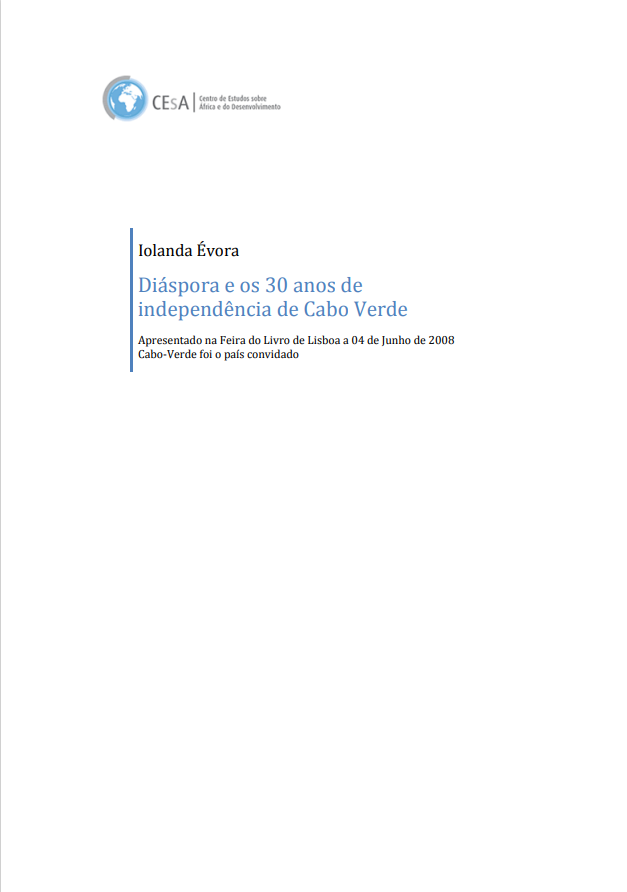
Diáspora e os 30 anos de independência de Cabo Verde
Abstract:
It would surprise most Cape Verdeans to know that what we live and designate as diaspora does not correspond to the most classical definitions about diaspora, which refer to secular migratory experiences that mobilise numerically significant populations and with a solid experience of exchange and mobility of long standing. But there are authors who argue that, for the term to be fruitful, it should be used in a neutral way and not be reserved only for certain populations whose social quality is ennobled: the exchange, in the case of traders, the intellectuals; the antiquity of the civilisation (in the case of the Greeks, Chinese or Indians) or the extent of the original catastrophe (in the case of the Jews, Armenians or Palestinians). These authors say that, in order to have value, it must be applied to all dispersed populations that maintain links, whatever their prestige. On the contrary, Cape Verdeans in general seem to have no doubt that we are a diaspora and it was during the last few years that the term has been consolidated among us and has come to define an important aspect of Cape Verdean society and sociability. Diaspora came to designate us as a historical collectivity which, with its dispersion in different political organisations (or because of this dispersion, in my opinion), maintains a reference to a collective identity and forms of solidarity among itself. Diáspora e os 30 anos de independência de Cabo Verde is a communication presented in Lisbon, 4th June 2008 Book Fair. Cape Verde was an invited country.
Quotation:
Évora, Iolanda. 2011. “Diáspora e os 30 anos de independência de Cabo Verde”. Comunicação apresentada na Feira do livro, Lisboa.
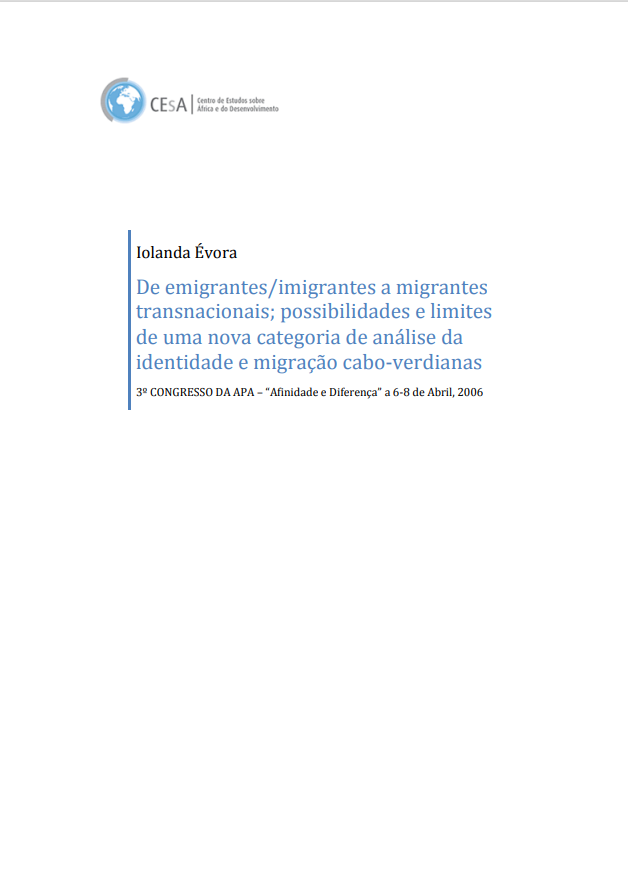
De Emigrantes/Imigrantes a Migrantes Transnacionais; Possibilidades e limites de uma nova categoria de análise da identidade e migração cabo-verdianas
Abstract:
In the field of Cape Verdean migration, transnationalism has been consolidating itself as a new lens for approaching the old experiences of exchanges and participation in social practices that transcend national borders. At the same time, studies on Cape Verdean identity and migration show the preponderance of the dual existence of emigrants/immigrants as a way of recognizing people and groups. In De emigrantes/imigrantes a migrantes transnacionais; possibilidades e limites de uma nova categoria de análise da identidade e migração cabo-verdianas, we propose to examine the correspondences or oppositions between the evident consolidation of Cape Verdean transnationalism as an object of study of the social sciences and the possibilities of constituting a new identity constellation through which individuals and groups recognize themselves as transnational migrants. Transnationalism and identity are concepts whose juxtaposition seems inherent, insofar as, as a social field, transnationalism includes sociological variables that exert a discernible effect on the psychological field of identity. From the perspective of the social field, the changes that the transnational way of living operates in the ways of living assimilation/exclusion in places of immigration and, among other ties, the myth of the return to origin, will be examined. A new dynamism in the construction, negotiation and reproduction of identities means, for each actor, defining themselves differently in terms of class, race and gender. In addition, other social categories may emerge in this context, and even with different degrees of salience among themselves, in the social field, they support the need for new reference structures that can capture the social and economic experiences of migrants in different places.
Quotation:
Évora, Iolanda. 2011. “De emigrantes/imigrantes a migrantes transnacionais; possibilidades e limites de uma nova categoria de análise da identidade e migração cabo-verdianas”. Comunicação apresentada ao 3º Congresso da APA – Afinidade e Diferença. Lisboa
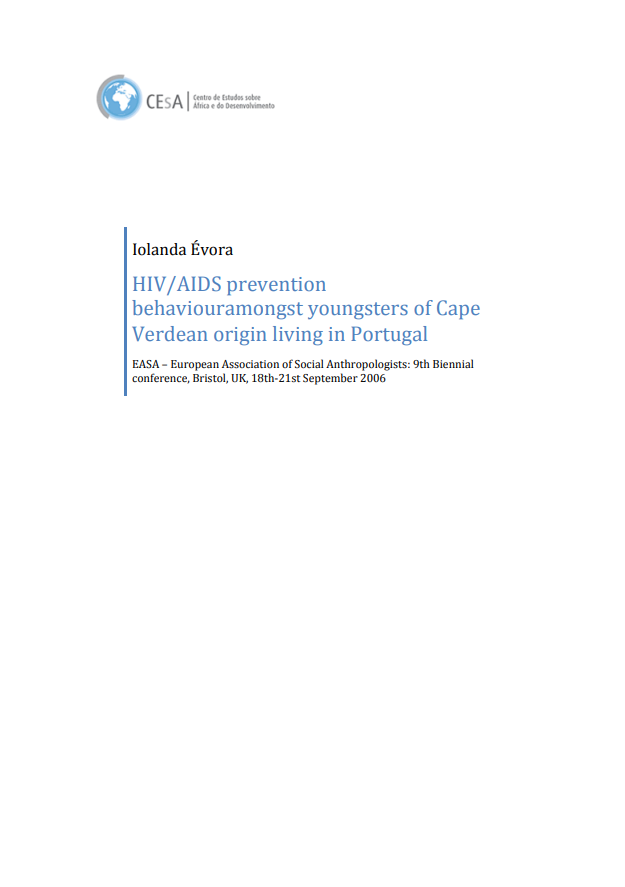
HIV/AIDS Prevention Behaviour Amongst Youngsters of Cape Verdean Origin Living in Portugal
Abstract:
This paper deals with the preventive AIDS behaviour of youngsters of Cape Verdean origin living in Lisbon. It focuses on the group practices and representations of AIDS and gender oriented sexual behaviour. Based on an ongoing research project, the paper argues how AIDS has the potential to become another discriminatory factor in a group already racially and socially stigmatized. This research aims to understand the relation between what young people know about HIV/AIDS and their active prevention behaviour. In addition, it explores how the immigration context may interfere in their behaviour and opinions towards HIV/AIDS and in the practices considered the safest ones to adopt. Therefore, this research is amongst those that aim to ground HIV/AIDS health education proposals on a clear understanding of how different populations or groups conceive their own healthcare. For that purpose, we selected a sample of young people from Cape Verdean origin presently living in Portugal, born in or outside of Cape Verde. Both genders were equally present (8 men and 7 women), aged between 16 and 26 and living in council estates, in other words, housing built on council’s urban redevelopment projects to relocate people from the slums. The areas of interest were chosen for presenting a high number of Cape Verdeans or their descendents: Lisbon, the Greater Lisbon and Loulé. We presuppose that belonging to these areas implies a particular social and economical context; for, although debatable, the definition of ‘council relocation housings’ conveys, to a great extent, a social categorization applied by a system of social classification to immigrants in Portugal. Accordingly, we considered eventual repercussions on the youngsters’ social experience and on their material and symbolic existential conditions, upon which rely daily decisions concerning health and prevention. A qualitative methodology of data collection was adopted, to allow an exhaustive explanatory study and the identification of several perceptual and behavioural patterns. Such methodology, developed by Rodrigues (1978,1999), is the most adequate to reach ‘irrational’ content – denomination commonly applied in Social Sciences to factors that “exist, but cannot be apprehended by reason” (Rodrigues, 1999, p.4). As the author refers, it is about reaching “that which cannot be measured, but is worthy of being known”, more specifically, the emotional content and deeper meaning of youth’s explanations regarding HIV/AIDS prevention behaviour. Thorough individual interviews were carried out, aiming to collect a material able to reveal the representations, the type of perception, the explanatory resources used, the justifications produced according to the roles occupied within a certain group, particularly, their position regarding immigration and HIV/AIDS. By using self-examination (free discourse), we were able to identify main areas of interest and concern, their importance, how they interrelate with their life and the surrounding world. Moreover, aiming to identify exactly how the interviewees place the AIDS issue within their life concerns. Intermediary Questions enable us to explore HIV/AIDS issues relevant to the project, though not spontaneously raised by the youngster during the Free Discourse approach. The Socioeconomic Questionnaire enabled an understanding of the life conditions of this group in Portugal, as well as of their family history. Today we shall discuss here the subject of family migration in its different phases and by each individual.
Quotation:
Évora, Iolanda. 2011. “HIV/AIDS prevention behaviour amongst youngsters of Cape Verdean origin living in Portugal”. Comunicação apresentada na EASA – European Association of Social Anthropologists : 9th Biennial Conference, Bristol, United Kingdom.
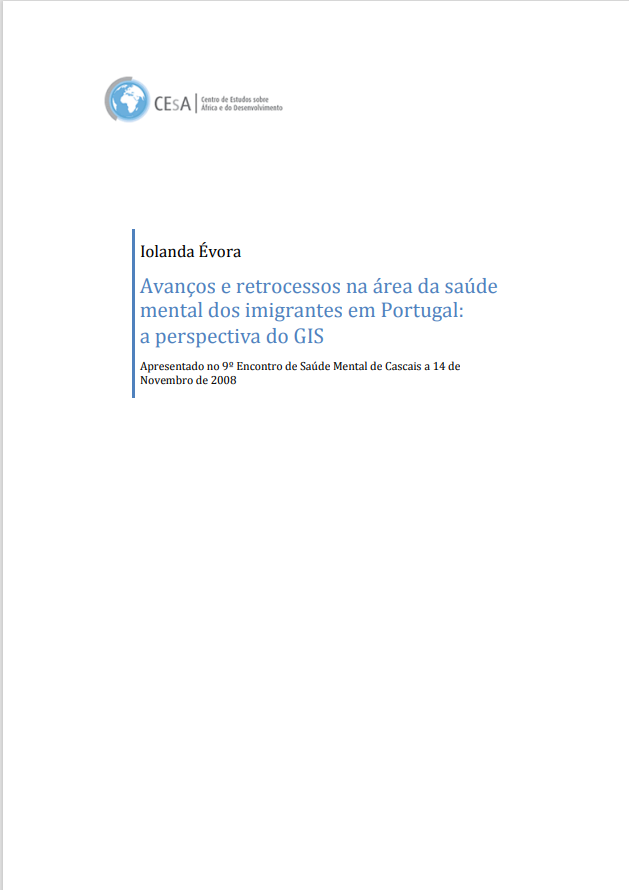
Avanços e Retrocessos na Área da Saúde Mental dos Imigrantes em Portugal: A perspectiva do GIS
Abstract:
The GIS Association (formally called Salpisign-GIS Association) is a non-profit association dedicated to research, service delivery and intervention in the area of migration and health. We focus on migrants, refugees and ethnic minorities, as well as on the quality of health services and intercultural training of health workers. In our action, we see the access to health as a fundamental right of an inclusive society in the expression of the rights and duties of citizenship. The GIS Association was created in 2007 and consists of 7 members (coincidentally, all female: anthropologists, social psychologists, sociologists and philosophers) and works in collaboration with other professionals and researchers, according to projects under development. The GIS Association – Immigration and Health Group has as its main objective the promotion of the health of the migrant population, through the development of research, training and intervention actions, through the creation of scientific, technical and informative dialogues between the Medical Sciences, the Social Sciences and Humanities and the socioculturally constituted knowledge of the immigrants and refugees themselves. Avanços e retrocessos na área da saúde mental dos imigrantes em Portugal: a perspectiva do GIS was presented at the 9th Cascais Mental Health Meeting on 14.11.08
Quotation:
Évora, Iolanda. 2011. “Avanços e retrocessos na área da saúde mental dos imigrantes em Portugal: a perspectiva do GIS”. Comunicação apresentada no 9º Encontro de Saúde Mental, Cascais.
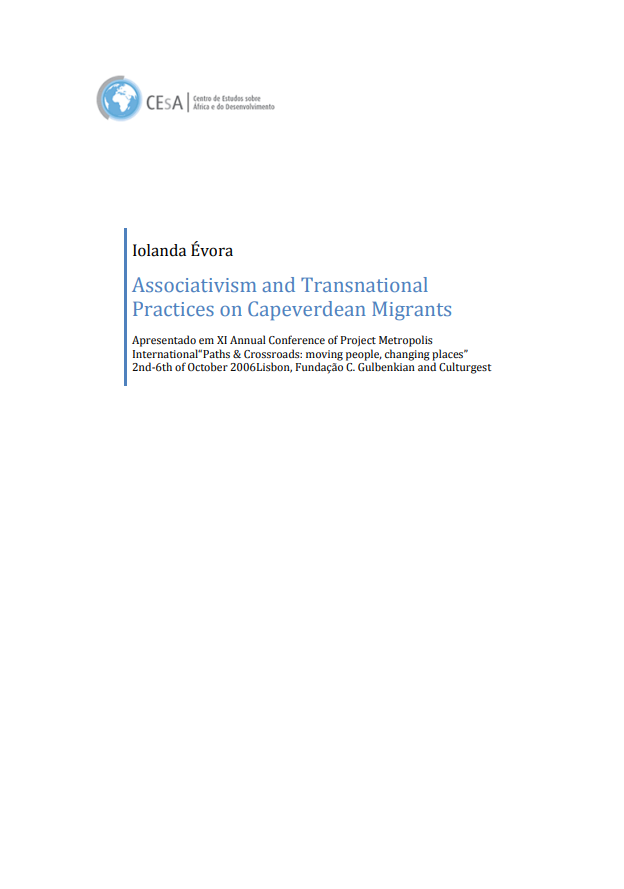
Associativism and Transnational Practices on Capeverdean Migrants
Abstract:
In Associativism and Transnational Practices on Capeverdean Migrants”. Comunicação apredentada na XI Annual Conference of Project Metropolis International “Paths & Crossroads: moving people, changing places we propose a reflection on the role that the Capeverdean immigrant associations have towards the intensification of transnational practices in the Capeverdean community. We consider that transnationalism as a characteristic per excellence of the contemporary Capeverdean migration creates a change in the goal set by associations which are traditionally involved either by defending the origin of the identity or by social inclusion from the place of destiny. We reached the conclusion that transnational immigrants are not yet identified in their specific needs by associative organizations. However, studies have demonstrated that like transnational collective strategies such as the Congresso de Quadros Cabo-verdianos da Diáspora for example, transnational practices of the small immigrant supported by informal networks of a more spontaneous character are also an important sign of the passing of a Diaspora to a transnational community alloying to identify the practice of an active migratory culture and the appeal to an accumulated migratory knowledge which aids the implementation of intense and frequent types of circulation and contact amongst the different Diaspora cores.
Quotation:
Évora, Iolanda. 2011. “Associativism and Transnational Practices on Capeverdean Migrants”. Comunicação apredentada na XI Annual Conference of Project Metropolis International “Paths & Crossroads: moving people, changing places”, Fundação C. Gulbenkian and Culturgest,Lisbon.
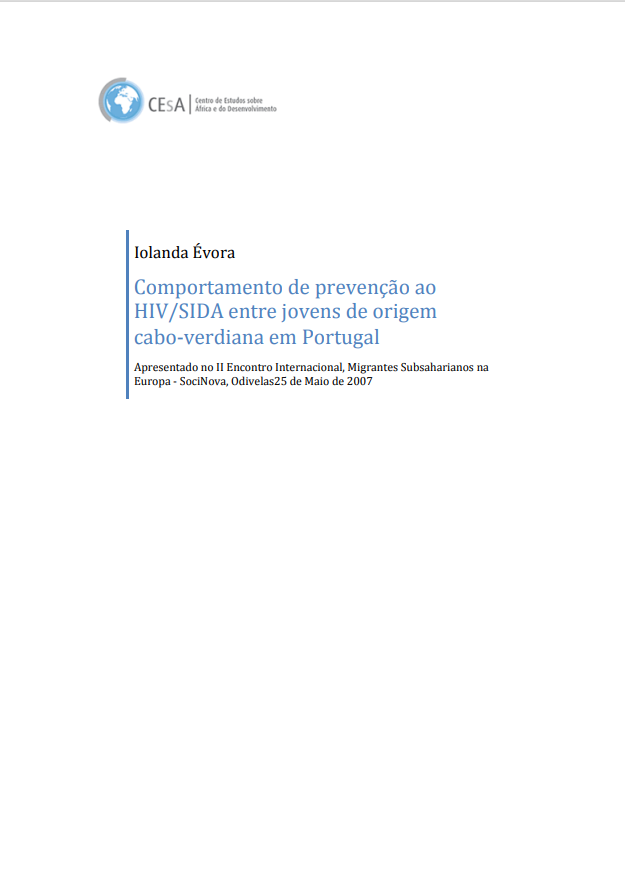
Comportamento de prevenção ao HIV/SIDA entre jovens de origem cabo-verdiana em Portugal
Abstract:
This study that we carried out, and whose partial results are presented here, deals with the prevention behavior of the young Cape Verdean population immigrated to Portugal in relation to HIV/AIDS. The promoters of Comportamento de prevenção ao HIV/SIDA entre jovens de origem cabo-verdiana em Portugal were two Cape Verdean institutions: the Ministry of Foreign Affairs and the Cape Verde AIDS Coordination Committee, sponsored by the World Bank. The aim of this study was to understand the relationship (or gap) between the knowledge that young people have about HIV/AIDS and their day-to-day prevention practices. Likewise, we tried to explore the possible interferences of the immigration factor in the attitudes and theories of young people about HIV/AIDS and the behaviors they consider the safest. The study is, therefore, among those that seek to support health education proposals related to HIV/AIDS, based on the understanding of the way in which different populations or communities conceive health care. The study was carried out with young people of Cape Verdean origin living in Portugal, whether or not they were born in Cape Verde. We cover both sexes equally (8 men and 7 women), aged between 16-26 years and living in social relocation neighborhoods, that is, neighborhoods built by municipal structures to replace slums. The regions covered were those with a large number of Cape Verdeans and their descendants: Lisbon, Greater Lisbon and Loulé. We believe that belonging to such spaces circumscribes the social and economic situation of this group because, although questionable, the definition of rehousing neighborhoods contains a social categorization, to a large extent, attributed by the dominant social classification system to young people of immigrant origin in the country. Therefore, we consider this definition because of its implications in the social experience of these young people and in the material and symbolic conditions of existence, on which daily decisions regarding health care and prevention depend. We chose to use a qualitative methodology for data collection that would allow for an in-depth exploratory study and the identification of certain patterns of behavior and perception. This methodology, developed by Rodrigues (1978, 1999) seemed to us to be more suitable for reaching irrational contents, a name that is often attributed by the social sciences to factors that “exist, but cannot be apprehended by reason” (Rodrigues, 1999, p.4). ). As the author says, it is about trying to achieve “what cannot be measured, but which is worth knowing”, that is, the emotional contents and deeper meanings of young people’s explanations about preventive behaviors in relation to HIV/AIDS. We carried out in-depth individual interviews in order to lead the subjects to produce material capable of revealing the representations, the type of perception, the explanatory resources used and the explanations they produce, based on the positions they occupy within their groups, in particular, the position on immigration and HIV/AIDS. Based on self-reflection (free speech), we identified the themes of interest and concern of each young person interviewed, the sequence of themes and the way in which the young person interconnects aspects of his life and his world. Above all, we sought to recognize the place where subjects place the issue of AIDS among the themes of their lives. With the Intermediate Questions, we proposed in Comportamento de prevenção ao HIV/SIDA entre jovens de origem cabo-verdiana em Portugal to explore the issues about HIV/AIDS that were of interest to the project and that had not been brought up, spontaneously, by the young person in the first part of the free speech. Finally, the Socio-Economic Questionnaire made it possible to reach the living conditions of this group in Portugal and also their family history. Here we include questions about the migration of your family group in its different stages and for each of its members.
Quotation:
Évora, Iolanda. 2011. “Comportamento de prevenção ao HIV/SIDA entre jovens de origem cabo-verdiana em Portugal”. Comunicação apresentada no II Encontro Internacional, Migrantes Subsaharianos na Europa, SociNova, Odivelas.
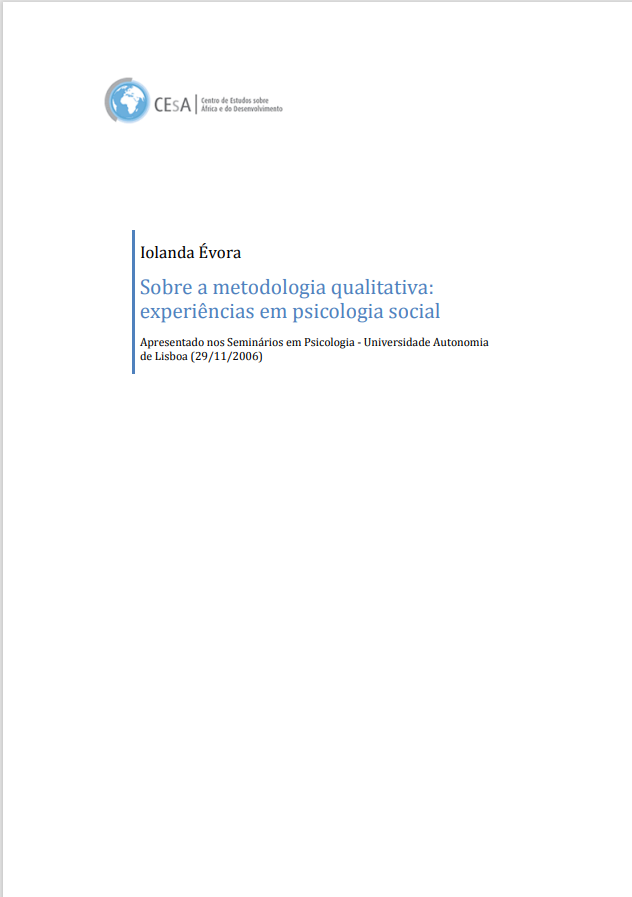
Sobre a Metodologia Qualitativa: Experiências em psicologia social
Abstract:
Often, the reference to qualitative methodology leads us to the great controversy about the scientificity of the social sciences in comparison with the natural sciences and to doubts about the attribution of the status of “science” to the social field, studied in Sobre a metodologia qualitativa: experiências em psicologia social. There are those who argue that this attribution (of scientificity) will only be possible if the same procedures are applied to the social that are used to understand the natural. For others, on the contrary, the important thing is to claim the total difference and specificity of the human field and to show that the work for the knowledge of the social must reach the symbolic, historical and concrete orders. In the symbolic dimension, the meanings of the subjects are included; the historical dimension – of time consolidated in the real and analytical space – includes the fact that social actors resort to their experience and memory to recompose facts that took place within their temporality. The concrete dimension is related to the structures and social actors in relation. Hence the statement that the social sciences deal with phenomena marked by relativity, unpredictability and specificity.
Quotation:
Évora, Iolanda. 2011. “Sobre a metodologia qualitativa: experiências em psicologia social”. Comunicação apresentada nos Seminários em Psicologia, Universidade Autonomia de Lisboa
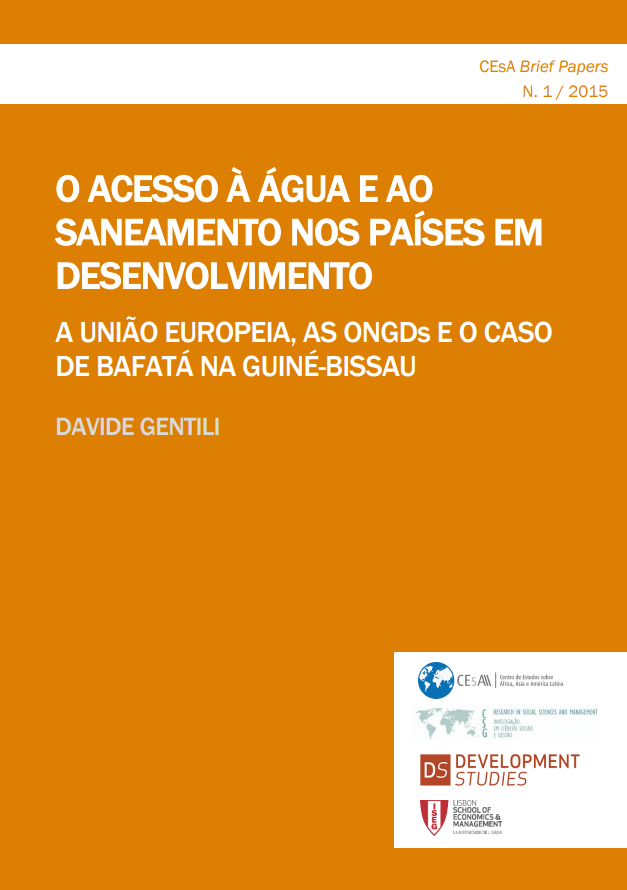
Brief Paper 1/2015: O Acesso à Água e ao Saneamento nos Países em Desenvolvimento: a União Europeia, as ONGDs e o caso de Bafatá na Guiné-Bissau
Abstract:
O acesso à água e ao saneamento nos países em desenvolvimento : a União Europeia, as ONGDs e o caso de Bafatá na Guiné-Bissau is born from the readaptation of the master’s thesis “Access to water and sanitation in developing countries: the European Union, NGDOs and the case of Bafatá in Guinea Bissau” carried out during 2014 and defended in November of the same year. The work is part of the theme of international cooperation with Developing Countries (DP) in the sector of water, sanitation and hygiene (WASH)3 and aims to investigate how good practices, agreed by international donors, for access to water and sanitation, influence the work of NGDOs operating in this sector. Thus, we sought to analyze how the European Union (EU), the most important donor in the WASH sector at an international level, has influenced the work in the WASH sector of the Portuguese NGDO – TESE – Associação para o Desenvolvimento. We tried to observe how TESE interprets the EU guidelines in the WASH sector, trying to understand if there is a blind adaptation to the guidelines in order to capture the funds, or if, on the contrary, there is a vision that guides the actions of TESE independently the availability of funding. In the first decade of the 2000s, the EU has strengthened its commitment to the WASH sector, funding numerous cooperation projects and actively contributing to the international political debate. Among the criteria that led to the choice of TESE, in addition to its geographical proximity and the opportunity to collaborate with the organization’s members, is the fact that it is one of the few NGDOs in Portugal committed to cooperation in the WASH sector in the Portuguese-speaking space. This, over the last decade, has established itself as a reference organization in the panorama of Portuguese NGDOs, being involved in several projects in the water and sanitation sector. Since its birth until today, there has been a substantial evolution of the organization, which now has a stable structure and well-defined objectives. Over time, TESE defined an intervention model specific to the organization. Among the projects carried out, one stands out, Bafatá Misti Iagu (BMI), co-financed by the EU in Bafatá, Guinea Bissau (GB). This will be the object of analysis as a case study. Between February and May 2014, the daily work of the TESE headquarters in Lisbon was monitored. Documents guiding EU cooperation and funding lines in the WASH sector were analyzed and compared with the results of the case study on Bafatá, writing the intervention context of the BMI project. from the analysis of documents of the projects carried out by TESE, from the evaluations of the projects and from the interviews carried out with current and previous members of the NGDO5. The comparison was mainly focused on: (1) the desired objectives, the target groups, the proposed actions and the approach promoted in the actions; (2) the approach to the key issues of access and management of water services. Here, we sought to compare the principles inherent to institutional and management issues (What is the resource management model that is promoted?), social and economic (What is the value attributed to water, in equity, in human rights, in gender equity? , in the quality of services promoted, and in questions of ownership, price, pricing of services?), and finally environmental, information, education, communication and technology6. This analysis resulted in a substantial approximation between the EU guidelines and the projects carried out by TESE. This result becomes more interesting considering that the line of financing with which TESE financed the BMI project in 2009 did not include specific guidelines on the water sector and the definition of objectives, expected results, activities and more in general. approach and is not subject to EC eligibility criteria in the WASH sector. Regarding the desired objectives, target groups, proposed actions and the approach promoted in the actions, there is a high correspondence of vision. TESE’s actions encompass both an infrastructural component (construction and rehabilitation of infrastructure, implementation of pollution prevention and water protection measures), and measures aimed at improving resource management in order to guarantee the durability of the intervention (awareness of the correct use of resources and education for hygiene, strengthening and management of institutions in the water sector). Among the measures shared by the EU and TESE aimed at resource management is the demand management, which, however, was not applied indiscriminately in the projects carried out by TESE, and each time there was a prior identification of the context and the your needs. The affinity of vision between EC and TESE remains constant, albeit with some difference, looking at the key access and management principles applied in the implementation of the BMI project (See Table A). This did not come about through the opening of a line of financing, but through the identification of the needs and opportunities for cooperation in Bafatá, in a perspective of complementarity and integration with other ongoing initiatives. The expected results were not defined to meet the eligibility conditions of the Call for Proposal -CfP-, but to have the best impact from the point of view of economic, human and environmental sustainability. The definition of these results derives from TESE’s own intervention pattern, which may change according to the context and requirements of the financing lines, but which in substance is not changed. Through the analysis of the projects carried out by TESE, it was possible to identify an intervention model of the organization. This model, the common thread between the projects, is an integral part of its cooperation strategy. Taking into account what has been observed, it can be said that TESE has a vision that guides its actions in the WASH sector, not limiting itself to applying ipsis verbis what is required in the EC CfPs. However, as we have seen, there is a good match between the objectives and good practices approved by the EC and the vision and work of TESE. Comparing the objectives, principles and proposed actions, it can be deduced that, taking as an example the application of the demand management principle, there is no implementation of internationally recognized good practices without a prior analysis of the intervention context.
Quotation:
Gentili, Davide (2015). “O acesso à água e ao saneamento nos países em desenvolvimento : a União Europeia, as ONGDs e o caso de Bafatá na Guiné-Bissau”. Instituto Superior de Economia e Gestão – CEsA Brief papers nº 1-2015.





